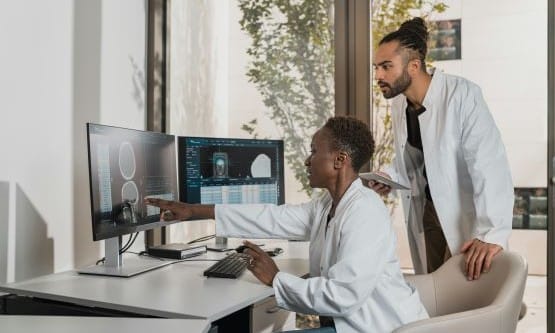Nottingham says PACS has already saved £1m
- 6 July 2007
The deployment of Picture Archiving and Communications Systems can save trusts over £1m each year, an NHS IT director has claimed.
Andrew Fearn, director of ICT services at Nottingham University Hospital NHS Trust says that his trust has made the savings, calculated before deductions on the cost of PACS, based on reductions in the costs of film processing and reduced staffing requirements
Speaking at the Smart Healthcare expo at the end of June Fearn said his trust has been using Agfa PACS deployed by Accenture for a year. He told the audience that critically patients were the main beneficiaries from the new digital imaging systems.
“Patients are seen and treated faster. In total, we could save up to £13m over the next eight years. Using PACS is safer, helps make better use of clinical time, is faster, provides better care and saves money – it’s a no brainer that trusts should deploy the system.”
Fearn presented the case study to the conference as ‘a brief tale of Robin Hood, Lacemakers and Luddites in the fair city of Nottingham’. He told the audience of how before the trust used PACS, they spent £964,000 annually on film processing, which is now reduced to £92,000.
Other benefits included more images being verified within 48 hours, and the turnaround for image reports has decreased from 80 hours to 35 hours. The trust has dramatically reduced its reliance on administration and clerical staff as well.
Describing Nottingham’s experiences of deploying PACS, Fearn shared lessons that had been learned in s trust, where the system was greeted with a mixed reception.
He told of how some welcomed the new technology, but others were more reluctant to do so, using the history of Nottingham and the tale of Robin Hood to explain his take on the challenge.
“Our city is famous for its Lacemakers who will only be happy if the product is perfect. And the descendants of our city said ‘It will only work if we‘ve got big plasma screens in our offices.’ And it was on the outskirts of our fair city in 1811, where the followers of Ned Ludd first decided technology wasn’t for them.
He continued: “And the descendants of the Luddites said ‘But I’ve been doing this for 30 years and I’m not changing now.’ So we had our work cut out. But we were lucky, there is an old saying “There are times when those who are saying it can’t be done are interrupted by those who’ve just done it! And we have a lot of people who like interrupting.”
However, Fearn said that from the moment he knew the trust would take the Agfa project, he was prepared for the challenge of altering existing work routines ahead of him and his team.
“You have to be prepared for surprising things to happen. The technology can change working practices faster than you think, but you must stick to your guns and have very, very thick skin as you’ll get great organisational support from the top, but maybe not so much from the actual staff.
“In Nottingham, we made it a priority to refuse to process film in the first two weeks of PACS. That meant that we were able to become 80% filmless in two weeks, the other 20% being related to breast cancer screening under NPfIT.”
Engaging with the clinical staff who will be using the system is also a must, he added.
“You should agree new working practices first and move away from the Lacemakers approach. In radiology, there is a lot to test, voice recognition support improves efficiency, but you have to make sure it works and have teachers on hand who can work with clinicians until they understand, electronic ordering is crucial and a good radiology information system is vital.
“Elsewhere, it is important to note that not everyone needs a high resolution PC. In fact, very few do, you have to be prepared to retrain and there are never enough devices. It is important that everyone realises the changes in sharing, no longer film but CD’s and teams will only become revolutionised over time.”
Fearn added that for a hospital’s IT team, PACS brings with it a host of new challenges that need to be dealt with.
He said: “You must be prepared for your network speeds to become slower. You need to have equipment that will cope with this new response. Images can’t just be looked at anywhere, we’ve had to deal with screens falling off walls, fortunately not smashing. Go-live is just the beginning, not the end and you must be on standby to provide ongoing development and support. It is also important to build good supplier relationships.”
In the last year alone, Nottingham has captured 436,464 images and the are now planning the next developments of the system. The big goal now is to become 100% filmless.
Also in the pipeline is the use of smart card access controls for the system, which Fearn says is a ‘cringing thought – especially when the orthopaedic surgeons realise they have to swipe in and out to view images.’
The trust is also aiming to soon connect to a new regional data store hosted by LSP Computer Sciences Corporation. They were initially provided with what was meant to be three years worth of storage, they now think this is likely to be maxed out within 18 months of going live.
Fearn says the current data and images should be migrated within six months. They plan to move to release two of the system in October or November this year.
He added that the savings and changes since the days of wet film processes have been well worth it, but it was important to remember that: “People make changes happen. Technology is only an enabler.”




